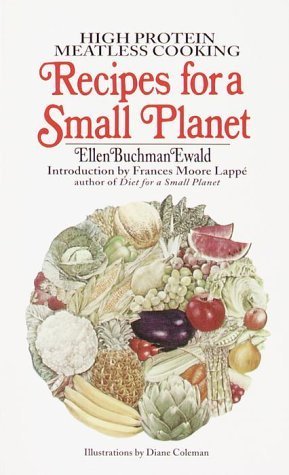This is one of the earlier nutritional vegetarian cookbooks, in the wake of Frances Lappe's "Diet for a Small Planet"(which pushed consuming complementary amino acids at the same sitting, which we now know is not really that important). This cookbook, thank God, recommends less powdered milk, the taste of which I find disgusting. I will say that the revised new edition of "Diet for a Small Planet" has significantly more appetizing recipes, and that Lappe and her daughter, with other collaborators, have done admirable work concerning global hunger. Ewald's book is not heavy on tofu--one soup recipe I believe--and very heavy on soybeans, which are hard to find these days. My primary care doctor assures me that soy is perfectly OK in view of estrogens. Moderately high fat, nuts and eggs and hard cheeses and so forth. Very whole grain. Not a bad cookbook.

